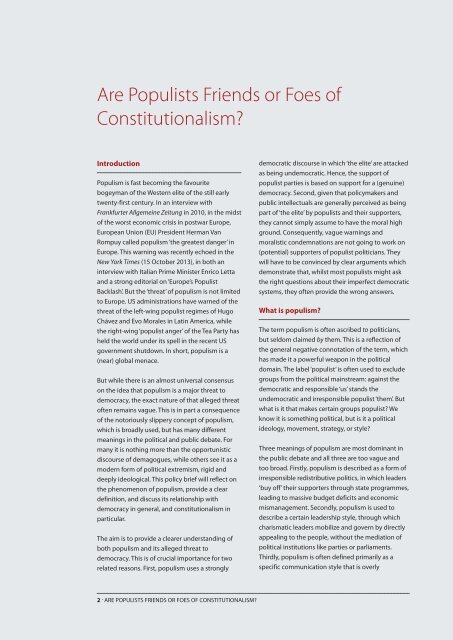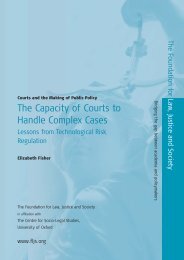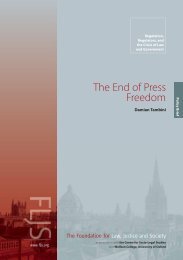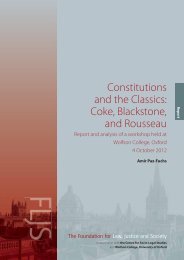<strong>Are</strong> <strong>Populists</strong> <strong>Friends</strong> <strong>or</strong> <strong>Foes</strong> <strong>of</strong><strong>Constitutionalism</strong>?IntroductionPopulism is fast becoming the favouritebogeyman <strong>of</strong> the Western elite <strong>of</strong> the still earlytwenty-first century. In an interview withFrankfurter Allgemeine Zeitung in 2010, in the midst<strong>of</strong> the w<strong>or</strong>st economic crisis in postwar Europe,European Union (EU) President Herman VanRompuy called populism ‘the greatest danger’ inEurope. This warning was recently echoed in theNew Y<strong>or</strong>k Times (15 October 2013), in both aninterview with Italian Prime Minister Enrico Lettaand a strong edit<strong>or</strong>ial on ‘Europe’s PopulistBacklash’. But the ‘threat’ <strong>of</strong> populism is not limitedto Europe. US administrations have warned <strong>of</strong> thethreat <strong>of</strong> the left-wing populist regimes <strong>of</strong> HugoChávez and Evo M<strong>or</strong>ales in Latin America, whilethe right-wing ‘populist anger’ <strong>of</strong> the Tea Party hasheld the w<strong>or</strong>ld under its spell in the recent USgovernment shutdown. In sh<strong>or</strong>t, populism is a(near) global menace.But while there is an almost universal consensuson the idea that populism is a maj<strong>or</strong> threat todemocracy, the exact nature <strong>of</strong> that alleged threat<strong>of</strong>ten remains vague. This is in part a consequence<strong>of</strong> the not<strong>or</strong>iously slippery concept <strong>of</strong> populism,which is broadly used, but has many differentmeanings in the political and public debate. F<strong>or</strong>many it is nothing m<strong>or</strong>e than the opp<strong>or</strong>tunisticdiscourse <strong>of</strong> demagogues, while others see it as amodern f<strong>or</strong>m <strong>of</strong> political extremism, rigid anddeeply ideological. This policy brief will reflect onthe phenomenon <strong>of</strong> populism, provide a cleardefinition, and discuss its relationship withdemocracy in general, and constitutionalism inparticular.The aim is to provide a clearer understanding <strong>of</strong>both populism and its alleged threat todemocracy. This is <strong>of</strong> crucial imp<strong>or</strong>tance f<strong>or</strong> tw<strong>or</strong>elated reasons. First, populism uses a stronglydemocratic discourse in which ‘the elite’ are attackedas being undemocratic. Hence, the supp<strong>or</strong>t <strong>of</strong>populist parties is based on supp<strong>or</strong>t f<strong>or</strong> a (genuine)democracy. Second, given that policymakers andpublic intellectuals are generally perceived as beingpart <strong>of</strong> ‘the elite’ by populists and their supp<strong>or</strong>ters,they cannot simply assume to have the m<strong>or</strong>al highground. Consequently, vague warnings andm<strong>or</strong>alistic condemnations are not going to w<strong>or</strong>k on(potential) supp<strong>or</strong>ters <strong>of</strong> populist politicians. Theywill have to be convinced by clear arguments whichdemonstrate that, whilst most populists might askthe right questions about their imperfect democraticsystems, they <strong>of</strong>ten provide the wrong answers.What is populism?The term populism is <strong>of</strong>ten ascribed to politicians,but seldom claimed by them. This is a reflection <strong>of</strong>the general negative connotation <strong>of</strong> the term, whichhas made it a powerful weapon in the politicaldomain. The label ‘populist’ is <strong>of</strong>ten used to excludegroups from the political mainstream: against thedemocratic and responsible ‘us’ stands theundemocratic and irresponsible populist ‘them’. Butwhat is it that makes certain groups populist? Weknow it is something political, but is it a politicalideology, movement, strategy, <strong>or</strong> style?Three meanings <strong>of</strong> populism are most dominant inthe public debate and all three are too vague andtoo broad. Firstly, populism is described as a f<strong>or</strong>m <strong>of</strong>irresponsible redistributive politics, in which leaders‘buy <strong>of</strong>f’ their supp<strong>or</strong>ters through state programmes,leading to massive budget deficits and economicmismanagement. Secondly, populism is used todescribe a certain leadership style, through whichcharismatic leaders mobilize and govern by directlyappealing to the people, without the mediation <strong>of</strong>political institutions like parties <strong>or</strong> parliaments.Thirdly, populism is <strong>of</strong>ten defined primarily as aspecific communication style that is overly2 . ARE POPULISTS FRIENDS OR FOES OF CONSTITUTIONALISM?
emotional and simplistic, pandering to ‘the commonman’ by using his language and symbols. While one<strong>or</strong> m<strong>or</strong>e <strong>of</strong> these features indeed apply to mostpopulist act<strong>or</strong>s, they do not set them apart fromnon-populists.In recent years, an increasing number <strong>of</strong> scholarshave come to define populism as an ideology <strong>or</strong>discourse. While the various details <strong>of</strong> the definitionsvary, almost all definitions share at least twocomponents: (1) a fundamental opposition between‘the people’ and ‘the elite’, and (2) populism is on theside <strong>of</strong> ‘the people’. Many definitions also stress theimp<strong>or</strong>tance <strong>of</strong> ‘common sense’ <strong>or</strong> the ‘general will’ <strong>of</strong>the people, explicitly <strong>or</strong> implicitly relating the latterto a Rousseauian understanding <strong>of</strong> democracy. Inline with this growing consensus within the field, Ipropose the following minimum definition: populismis a thin-centred ideology that considers society to beultimately separated into two homogeneous andantagonistic groups, ‘the pure people’ versus ‘thec<strong>or</strong>rupt elite’, and which argues that politics should bean expression <strong>of</strong> the volonté générale (general will) <strong>of</strong>the people. 1 This definition is broad enough toinclude all maj<strong>or</strong> populist phenomena, across regionand time, but narrow enough to exclude many other(non-populist) phenomena. Most imp<strong>or</strong>tantly,populism so defined has at least two fundamentaloppositions: elitism and pluralism. Consequently, itexcludes most political act<strong>or</strong>s and ideologies thatdominated politics bef<strong>or</strong>e the rise <strong>of</strong> democracy inthe late nineteenth century (e.g., monarchism,theocracy, conservatism) as well as those that havedominated democratic societies since then (e.g.,Christian democracy, liberalism, and socialdemocracy).Populism and democracyIn much <strong>of</strong> the public debate, populism is seen as athreat f<strong>or</strong> democracy. This is in line with mostscholarship on the topic, which had describedpopulism as a ‘democratic dis<strong>or</strong>der’, a ‘pathology <strong>of</strong>democracy’, and a ‘paranoid style <strong>of</strong> politics’. Amin<strong>or</strong>ity sees populism as democratic, and someeven as the ultimate f<strong>or</strong>m <strong>of</strong> democracy. F<strong>or</strong> all thepublic debate, the actual relationship betweenpopulism and democracy is, both in the<strong>or</strong>y andpractice, highly ambiguous and complex. 2The<strong>or</strong>etically, populism is not anti-democratic; itaccepts both popular sovereignty and maj<strong>or</strong>ity rule.It is, however, anti-liberal democratic. The fact thatmany auth<strong>or</strong>s use democracy as a sh<strong>or</strong>thand f<strong>or</strong>liberal democracy might explain the predominance<strong>of</strong> negative evaluations <strong>of</strong> populism in the literature.Populism is essentially anti–liberal democratic,because it opposes both the principle <strong>of</strong> pluralismand the practice <strong>of</strong> compromise. It is a monistideology, considering both ‘the people’ and the elite’as homogeneous and undivided. Thus, pluralism isfundamentally opposed, and min<strong>or</strong>ity rights areperceived as ‘special interests’ <strong>of</strong> ‘the elite’, which (inits zero-sum game w<strong>or</strong>ld) come at the expense <strong>of</strong>‘the people’. Populism theref<strong>or</strong>e also rejects thepolitics <strong>of</strong> compromise. It argues that politics canand should benefit all people. After all, ‘the people’are homogeneous and theref<strong>or</strong>e have similarinterests and n<strong>or</strong>ms. M<strong>or</strong>eover, being essentiallybased upon a m<strong>or</strong>al divide, f<strong>or</strong> populism,compromise means that ‘the pure’ are soiled by ‘thec<strong>or</strong>rupt’, which leads to the c<strong>or</strong>rupting <strong>of</strong> ‘the pure’.Consequently, populism supp<strong>or</strong>ts an extremistmaj<strong>or</strong>itarianism, even if the interests and n<strong>or</strong>ms <strong>of</strong>the maj<strong>or</strong>ity (i.e., the people) are <strong>of</strong>ten constructedby the populist leader. However, as the populistleader is part <strong>of</strong> the (homogeneous) people, unlikethe leaders <strong>of</strong> the other parties (who are part <strong>of</strong> theelite), his interests and n<strong>or</strong>ms are the same as those<strong>of</strong> the people.Populism puts its finger on the Achilles heel <strong>of</strong> liberaldemocracy, that is, the inherent tension betweenmaj<strong>or</strong>ity rule and min<strong>or</strong>ity rights. While democracy isbased on popular sovereignty and maj<strong>or</strong>ity rule,liberal democracy emphasizes restrictions on statepower and the constitutional protection <strong>of</strong> min<strong>or</strong>ityrights. Both liberal aspects can limit popularsovereignty and maj<strong>or</strong>ity rule. <strong>Populists</strong> squarelycome out on the side <strong>of</strong> democracy, which theyinterpret as ‘the power <strong>of</strong> the people and only thepower <strong>of</strong> the people.’ 3 Consequently, populismopposes any institutions <strong>or</strong> procedures that impedethe direct and full expression <strong>of</strong> the people’s voice.In practice, populists have both strengthened thedemocratic system in their country (e.g., M<strong>or</strong>ales inBolivia), and destroyed it (e.g., Fujim<strong>or</strong>i in Peru). Inline with the the<strong>or</strong>etical relationship, populists tendto mainly supp<strong>or</strong>t and strengthen democraticARE POPULISTS FRIENDS OR FOES OF CONSTITUTIONALISM? . 3






![Pirie Report [3]:Layout 1 - Foundation for Law, Justice and Society](https://img.yumpu.com/33886189/1/184x260/pirie-report-3layout-1-foundation-for-law-justice-and-society.jpg?quality=85)